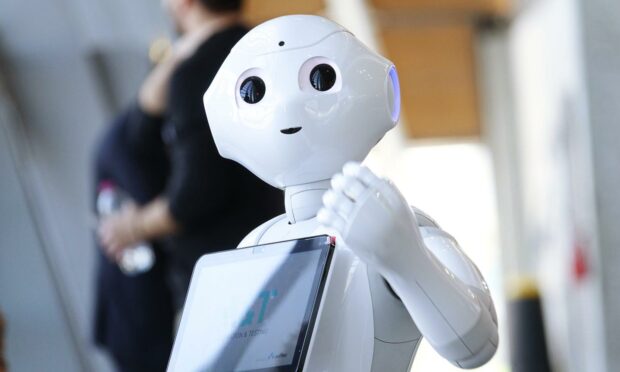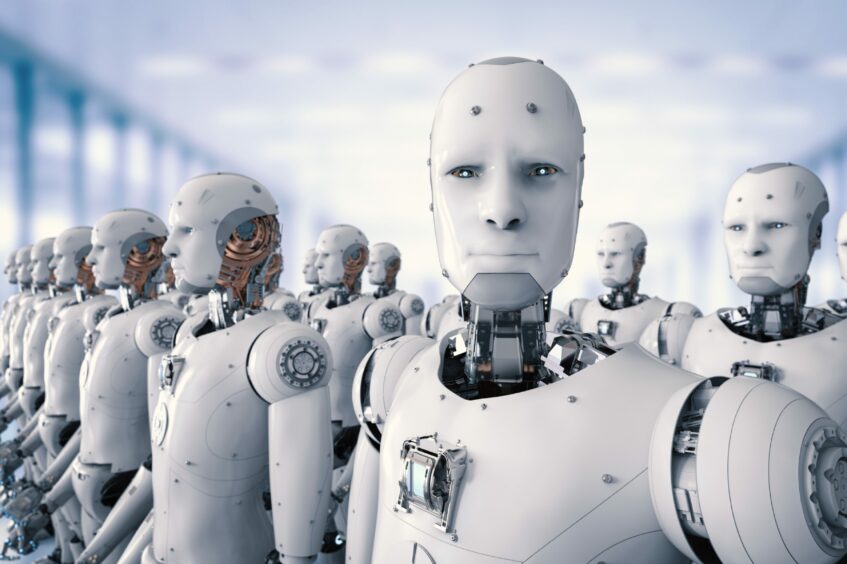Four-fifths (80%) of small and medium-sized enterprises in Scotland expect to employ robots or other artificial intelligence (AI) by 2035, study findings show.
Nearly half (49%) believe they will be reliant on renewable energy sources to power this advancement in technology.
And three-quarters (75%) say improving eco-friendliness will help their profitability and make them more attractive to investors.
More than one in five (21%) plan to transition to hybrid or fully electric vehicles.
When asked what roles robots would have, 36% of SMEs expect them to be used for tidying the workplace.
Carrying out hazardous tasks (39%) and entertainment (46%) were also cited.
As many as 46% believe robots will be stacking shelves and 32% expect them to be making products.
Fewer than one-fifth (18%) believe robots will replace customer services entirely.
Human contact and the emotional aspect that comes with certain jobs is a vital part of their appeal.”
Ian Pearson, futurologist.
The research was commissioned by Smart Energy GB, the UK Government-backed campaign promoting the benefits of smart meters.
Smart Energy GB’s study looked at how small businesses see themselves changing over the next 10-15 years, in both embracing future technology and adopting more environmentally friendly behaviours.
The survey also found eight in 10 firms think working from home will be normal in 2035, with male leaders more likely to support remote working (52%) than females (38%).
Fflur Lawton, head of public affairs, Smart Energy GB, said: “How businesses operate day-to-day is changing and the advancement in robotics and AI is an exciting prospect for many.
“But upgrading our energy system is key to integrating more renewable power and achieving these possibilities.
“Getting a smart meter installed on your business premises is a step in the right direction for Great Britain and will help your business take control of its energy use.”
In response to the research, futurologist Ian Pearson said people may be overestimating the importance of flexible working and underestimating the importance of robots and AI when it comes to the future of work.
Some industries are more likely to be impacted by robots and AI than others, he added.
Mr Pearson continued: “Human contact and the emotional aspect that comes with certain jobs is a vital part of their appeal, as these are jobs which are part of the ‘care economy’.
“Lots of people like the experience of human contact and the emotional aspect which comes with it – and that can’t be replaced.
“When it comes to hairdressers, machines could cut your hair using lasers to make sure each part of your hair is perfectly cut.
“But a robot can’t replicate the conversations which go with it.
“The same goes with the care sector, like nurses and doctors, and the emotional support they provide.”
Study highlights green trend
The research found business owners expect customers to increasingly want more ethically sourced goods and eco-friendly practices (27%), resulting in 13% choosing to reduce plastic in their products and 38% deciding to have a smart meter installed.
More than two-thirds (69%) expect to have to cut overheads to survive, with half (50%) keen to reduce energy costs and 30% looking to be more eco-friendly.
Ms Lawton, added: “As a nation we’re finding ways to be more environmentally conscious but also better manage our bills and this is no different for businesses.”


